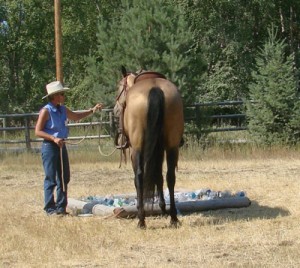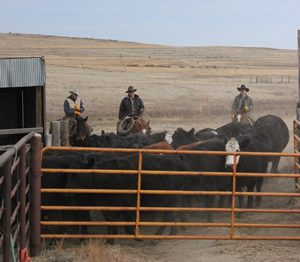Boo! It’s Halloween time. If, like me, you obsessively relate everything in the world to horses one way or another, then you no-doubt have a Halloween/horse connection. I’ll share mine here, which is excerpted from Going Somewhere, the fourth book in my five-book horsemanship memoir series. This spooky story is found in the second chapter, “Ideal Versus Adverse Conditions, Part Two: Thinking About It.”
Harry [Whitney] tells a great story to help people understand how a Tufted Titmouse can move a 1200+ pound Jubal [my amazing Quarter Horse] and send his rider to the hospital [a reference to chapter one, “Ideal Versus Adverse Conditions, Part One: The Wreck!”]. The tale is a cult classic among Harry’s students widely referred to as, “The Table Story.” I’ll recreate its mystery and intrigue to the best of my ability here.
It’s a dark and stormy night. You’re home alone in a big, old, creaky house. Lightning flashes, thunder reverberates, and driving rain pounds the window panes. The phone rings. You answer it, but there’s just silence on the other end. “Hello?” you say. You hear breathing, and then click, the line goes dead—not even a dial tone. Hmm, that’s weird, you think.
Then the power goes out. You’re left in total darkness except for the occasional flashes of lightning which cast eerie shadows around the rooms before plunging you into total darkness again. You find a flashlight and go into the basement to check the fuse box. No help there, it’s the outside line. There are noises on the floor above, so you cautiously climb back up the stairs and peer with your narrow flashlight beam around the living room. Tree limbs now are blowing against a window making tapping and scraping noises. The phone rings again. You answer. Oddly, even though it rang, there’s no sound on the other end…it’s still dead. Then your flashlight dies. You beat on it, but that doesn’t work. At this point you really start to wonder….
You’re startled by a knock at the door! You move quickly in the blackness towards it to see who might be there but you bump into a table by the end of the couch and knock it over—CRASH! The surprise terrifies you so badly you have a heart attack and die right there.
Then Harry asks, “Did the table kill you?”
 Is it the table’s fault you got killed? If it had been a sunny Tuesday afternoon and you had a couple friends over and you bumped into the table, surely you wouldn’t have had a heart attack and expired. Bumping into the table isn’t really the problem, right? It’s the adverse conditions surrounding your untimely fictitious death that amplified everything to that point. Get stressed out and then it only takes one little otherwise insignificant trigger to cause a huge reaction. The same is true for horses. And that’s just how Jubal-the-Massive, going along with brick hard muscles of tension from a haunted house of worries outside of his normal pastoral elements, spooks hard enough at a little bird to throw his amazingly agile rider’s back out.
Is it the table’s fault you got killed? If it had been a sunny Tuesday afternoon and you had a couple friends over and you bumped into the table, surely you wouldn’t have had a heart attack and expired. Bumping into the table isn’t really the problem, right? It’s the adverse conditions surrounding your untimely fictitious death that amplified everything to that point. Get stressed out and then it only takes one little otherwise insignificant trigger to cause a huge reaction. The same is true for horses. And that’s just how Jubal-the-Massive, going along with brick hard muscles of tension from a haunted house of worries outside of his normal pastoral elements, spooks hard enough at a little bird to throw his amazingly agile rider’s back out.
Ideal conditions—a round corral or arena with level sandy footing (moistened with a light sprinkling of water to hinder the dust), tall panels that have the square corners that meet tightly together to deter a wayward hoof from getting caught, the temperature at a steady 74.5 degrees, sunny with a slight breeze, and Harry Whitney sitting just the other side of the fence with a fresh battery in his mobile microphone to answer any questions and provide insights while you ride.
Adverse conditions—hmm…(where to start?), anywhere that is 50 steps away from wherever a horse usually lives, being 20 steps away from any horse buddy, anywhere around wildlife, going after a neighbor’s escaped cattle, rainy weather, windy weather, cold weather, hot weather, anywhere within sight of a trampoline with a kid on it, and anytime there is a real life reason to ask something of a horse right now because it really needs to happen.
Lately at clinics I’ve heard Harry discuss the contrast of working horses in ideal versus adverse conditions. Harry’s point is simple—if a person doesn’t have things going well with a horse under ideal conditions how can he possibly hope to have them working under adverse conditions?
It’s rhetorical; one can’t. (Not even on Jubal!)
Simply, Harry stresses that folks ought to do all they can to improve the relationship and communication with their horses in ideal settings to prepare their horses and themselves for forays into more adverse situations.
Horses, of course, don’t reason things the way humans do. In a way, that helps us use ideal conditions to improve things with a horse. We’re able to take a barn sour horse out of the barn and away from a buddy, for example, and put him in the extremely ideal conditions of a well groomed round pen just down the road a little ways. We have him in a relatively safe place that is small enough we can approach him with a conversation to seek a change and get him feeling better. The horse, however, runs circles, bucks, pushes the panels with his chest, and comes unglued. Horses possess the same life or death gravity with circumstances wherever they are, which means we can put horses in ideal settings, bring up these troubles, and address them right there as safely as possible.
Of course, this is why round corrals, arenas, and horse playgrounds (a.k.a. horse obstacle courses) are so helpful. We humans can use those big brains of ours to work our horses in a more controlled setting to see how things can go when we start to turn the heat up and ask more from them. We can simulate all kinds of situations that mimic things out in the world before we’re really faced with truly adverse conditions to see about getting and sustaining some with-you-ness before we really head out there.
So, if a person is having poor results attempting to ride a line inside the controlled environment of an arena, going outside and hitting the trail might be a disaster with all those additional “thought magnets” in the real world. (“Thought magnet” is my term for a serious horse distraction—these are introduced and extensively explored in a chapter in Between the Reins.) However, having a “job” can help create focus and interest that the horse picks up on. Working on this inside the ideal settings of an arena or round pen instead of outside in the world obviously reduces the chances of a big fat wreck. I’ve seen Harry get it done tons of times. However, it requires some imagination on the part of the human, not the horse.
 One of the great gifts I’m enjoying from being a longtime student of Harry’s is that I’m beginning to understand how obvious trouble with my horses really manifests in smaller ways before the bigger things become evident. Catching those smaller trouble spots sooner allows me to get in there and work my horse through them. Get that little stuff cleared out and the big things can melt away and we never have to encounter big trouble.
One of the great gifts I’m enjoying from being a longtime student of Harry’s is that I’m beginning to understand how obvious trouble with my horses really manifests in smaller ways before the bigger things become evident. Catching those smaller trouble spots sooner allows me to get in there and work my horse through them. Get that little stuff cleared out and the big things can melt away and we never have to encounter big trouble.
If a horse has a little (or big) problem, and can’t stay with you when being haltered and led out of the paddock to get saddled in the first place (i.e. my moment before heading out with Jubal to round up those cows next door), good luck on getting him with you to go ride anywhere. So, just thinking about juxtaposing what a particular horse looks like in the ideal setting versus the adverse setting might get a person thinking about these things.
Since my earliest attempts to ride I’ve found it hard to reconcile the balance between working horses in ideal versus adverse conditions, although I didn’t think of it in exactly those terms. My desire to go out and get things done with my horses often resulted in less than desirable results. Clearly, that is a huge theme that weaves all through my series of horsemanship memoirs. The books reveal many of the difficulties I’ve encountered when attempting to climb aboard and push into ACT [Adverse Conditions Territory] while still ill prepared. I suppose finding a balance between these two scenarios really is a pivotal focus of my ongoing horsemanship journey.


